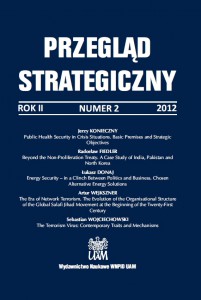DEVELOPMENT OF SOCIAL SCIENCES IN
DISSERTATIONS OF IMMANUEL WALLERSTEIN – IMPLICATIONS FOR THE THEORY OF INTERNATIONAL RELATIONS
DEVELOPMENT OF SOCIAL SCIENCES IN
DISSERTATIONS OF IMMANUEL WALLERSTEIN – IMPLICATIONS FOR THE THEORY OF INTERNATIONAL RELATIONS
Author(s): Remigiusz RosickiSubject(s): Politics, Political Theory
Published by: Uniwersytet Adama Mickiewicza
Keywords: Immanuel Wallerstein; theory of international relations
Summary/Abstract: This paper presents an analysis of the social science development concept of Immanuel Wallerstein. In general terms we can say that the development of social sciences was based on a process of emancipation of individual subjects of research and validation of research methods. I. Wallerstein drew attention to the process of emancipation of individual disciplines, therefore we can talk about the separation of philosophy, followed by social sciences and, negatively evaluated by I. Wallerstein, applied social sciences. With the constitution of individual disciplines we dealt with the process of polarising methodological positions, which can be roughly described as the concept of two cultures. The text describes the following issues: (1) the directions of emancipation of scientific disciplines, (2) the processes of emancipation of scientific disciplines, (3) the dynamics of changes in social sciences, (4) the effects of changes occurring in sciences. In addition to the main assumptions of I. Wallerstein on science, the text attempts to confront these assumptions with the achievements of T. S. Kuhn, R. K. Merton and C. W. Mills. The aim of the article is to point out the implications for the “theory of international relations” deriving from the general trends in the development of social sciences. This issue has come down to only selected issues of: microscopisation, idealisation, metaphorical use, deformation, transcendentalisation, fictionalisation and fetishisation of notions in the “theory of international relations”.
Journal: Przegląd Strategiczny
- Issue Year: II/2012
- Issue No: 2
- Page Range: 158-170
- Page Count: 13
- Language: English

